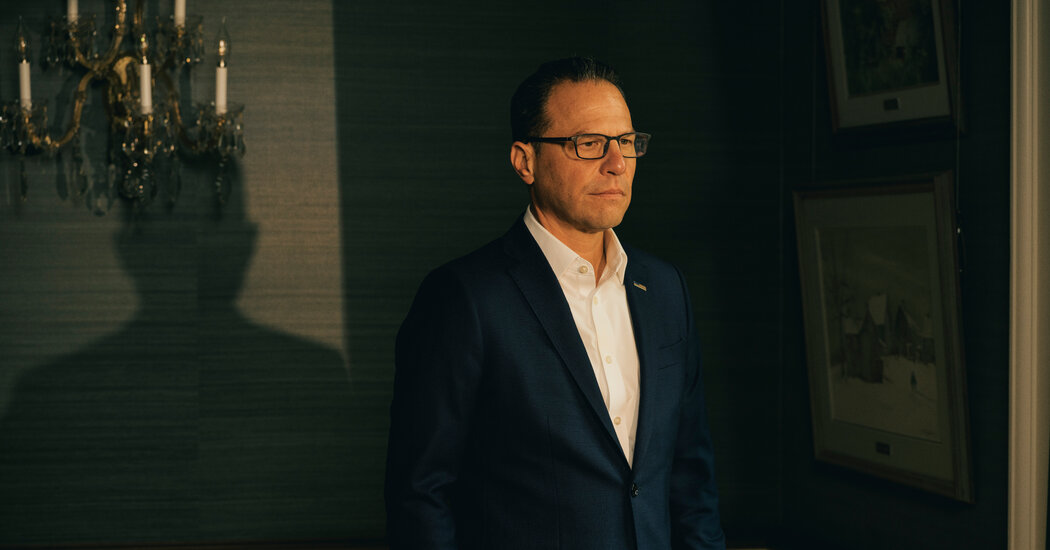Six months after an arsonist firebombed the Pennsylvania governor’s residence on Passover, Gov. Josh Shapiro was preparing to welcome guests back for the Jewish holiday of Sukkot.
As staff members assembled the buffet — roasted salmon, pumpkin cheesecake, elaborate squash dishes — in the state dining room, there were few visual reminders of the Molotov cocktails that tore through there in April as the Shapiros slept upstairs, other than a display case containing charred plates, cups and a Passover Haggadah that survived the assault.
But as Mr. Shapiro, a Democrat, sat in his private office to offer his most detailed accounting yet of the attack and its aftermath, he was thinking about the less visible consequences of that night.
“The hardest part for me has been navigating this as a dad,” Mr. Shapiro said in a wide-ranging, hourlong interview, in which he was by turns defiant and vulnerable. “Grappling with the sort of personal guilt that your job put your kids in a position where they could have been harmed.”
Sitting just down the hallway from the window the assailant smashed to enter the residence, Mr. Shapiro said political violence “leaves behind emotional scars. And I think we’re working through that as a family.”
Like many other elected officials, Mr. Shapiro — one of America’s most prominent Jewish Democrats, a finalist in Kamala Harris’s vice-presidential search, potentially a future presidential candidate himself — has long known that life in the public eye carries personal risk.
He saw that while serving as Pennsylvania’s attorney general, a role he held when 11 people were murdered at a Pittsburgh synagogue, seven years ago on Monday. He experienced it while running for governor, when his opponent invoked his children’s Jewish day school in what was widely seen as an antisemitic dog whistle. Pennsylvania is where President Trump was shot during a 2024 rally, and where Luigi Mangione, accused of assassinating UnitedHealthcare’s chief executive, was apprehended.
But as common as political violence has become, Mr. Shapiro knows it can feel abstract.
He is now advising others who have been touched by political violence, and potential candidates who worry about the risks.
He is also warning the country, with increasing urgency, not to grow numb.
“Those risks just felt very theoretical to me,” Mr. Shapiro said recently. “Sadly, this made it all real.”
‘Whoever did this was obviously still out there’
Just before sunset on April 12, Mr. Shapiro offered Passover greetings on social media and included a photograph of a table set for the holiday meal at the governor’s residence.
It was not unusual for Mr. Shapiro, a popular governor who faces re-election next year, to offer a glimpse into his religious observance. His first television ad in his 2022 race for governor featured his family celebrating the Sabbath because, he said at the time, “family and faith ground me.”
He led the Seder, joined by friends and family including three of his four children, who range in age from 14 to 23, as well as Mr. Shapiro’s siblings and their young families.
By 2 a.m., the room where they had celebrated was on fire.
According to law enforcement officials, a man named Cody Balmer had climbed over an iron fence and darted onto the property. He shattered one window with a small sledgehammer, hurled a Molotov cocktail into the residence and then smashed another window to enter the state dining room.
Mr. Balmer, who wanted to bludgeon Mr. Shapiro with the hammer, cited what the governor “wants to do to the Palestinian people,” according to a police search warrant. (It was unclear what Mr. Balmer, who has a lengthy history of mental illness, was referencing. Mr. Shapiro, who welcomed news of the cease-fire and hostage release deal and backs a two-state solution for Israelis and Palestinians, has been criticized by Palestinian rights activists as excessively harsh toward campus protesters and too sympathetic to Israel.)
Only a set of thick double doors, which the assailant struggled to open as smoke filled the room, separated Mr. Balmer from the private offices of Mr. Shapiro and his wife, Lori, and their living quarters beyond. He set another fire on his way out.
Awoken by yelling and then a state trooper pounding on his door, the governor, his family and their two dogs evacuated into the chilly night. Within an hour, Mr. Shapiro said, he was informed the fire was a targeted attack.
“All I was focused on was making sure my family was safe, because whoever did this was obviously still out there,” Mr. Shapiro said. “And figuring out a way as a dad, together with Lori, to explain this to our children.”
After dropping his family off at their private home in suburban Philadelphia, Mr. Shapiro returned to the governor’s residence in Harrisburg by Sunday afternoon, taking in security briefings as the authorities investigated. Mr. Balmer was apprehended later that day.
“This type of violence is not OK,” Mr. Shapiro said at a news conference that afternoon, his voice rising after he stopped to collect himself. “This kind of violence is becoming far too common in our society. And I don’t give a damn if it’s coming from one particular side or the other.”
Afterward, he drove to his sister’s house outside Philadelphia, two doors down from his own, to observe the second night of Passover. On the way, Mr. Shapiro called his brother to turn over the role of leading the Seder, the ritual retelling of the Passover story.
“I said to him, ‘You got to lead this one, I can’t — I’m not sure I can do that right now,’” he recalled.
But the governor and his wife were adamant that the holiday go on. So the family, clad in sweatpants and reaching for folding chairs and paper plates in his sister’s dining room, held an impromptu dinner.
The attack had left Mr. Shapiro “shaken up” but determined, said State Representative Dan Frankel of Pittsburgh, who has known Mr. Shapiro for two decades.
And, Mr. Frankel said, he rapidly realized the incident would resonate beyond Pennsylvania.
‘I’ve got to show that we’re not afraid’
Within days of the attack, Mr. Shapiro was back in public.
The Shapiros brought lunch to a Harrisburg fire station, working with the celebrity chef Robert Irvine. They took comfort, they said, in prayers from Pennsylvanians of all faiths, and he stressed his trust in law enforcement.
Privately, he was navigating his family’s healing, and his own.
“It doesn’t just happen one day and the next day, you go back to how things were,” Gov. Gretchen Whitmer of Michigan, who was the target of a kidnapping plot, said in a telephone interview. But, she added, “I don’t get a sense that he is deterred.”
Still, some observers thought the ordeal would cause even Mr. Shapiro, an ambitious and self-assured politician, to reconsider life on the national stage.
“He would not be a human being if it didn’t,” Representative James E. Clyburn, the influential South Carolina Democrat, told The New York Times in May.
Mr. Shapiro acknowledged that his family had discussed whether elected office was worth it.
“What I’ve said is, if I leave because violence pushed us out or scared us, then those who want to perpetuate political violence win,” he said. “I’ve got to stay, and I’ve got to show that we’re not afraid.”
He did not seek therapy, he said, instead processing the attack through walks with his wife, who has been his best friend since ninth grade.
Their biggest concern was helping their children cope.
Over the summer, with reconstruction underway at the residence and new security measures in place, the whole family, including his grown children, decided to spend a night there. Both sets of grandparents joined for Sabbath dinner. Mr. Shapiro tossed a baseball around with one son, while another occupied himself with a lacrosse net.
Mr. Shapiro was nervous about how everyone would sleep.
“It felt really normal when we just kind of went upstairs to the living quarters, and everybody went to their rooms and just kind of did their normal routines,” he said.
But as they would be reminded frequently in the following months, little is normal in this political climate.
“It’s gotten hotter and hotter,” Ms. Whitmer said, “and more and more dangerous.”
‘Suppressing it doesn’t make you a tough guy’
Mr. Shapiro quickly understood that the attack on his residence was “not an isolated incident,” recalled Gov. Tim Walz of Minnesota, discussing their shared concerns about the rising political temperature.
Two months later, Mr. Shapiro reached out to Mr. Walz, after Melissa Hortman, a former speaker of the Minnesota House, and her husband were assassinated.
Since the attack, Mr. Shapiro said, he has had many conversations with elected leaders and others thinking about public office.
“Knowing that as you’re doing that work that I consider to be noble, that it comes with a risk to you and your family,” he said, “that’s a tension that is a challenge to work through.”
“It is one of the reasons why I’m so motivated to speak out against political violence,” he added. To “try and take the temperature down so that good people want to serve.”
He tells other politicians to speak openly with their children, and to lean on security experts. And he said that he can now offer more personal guidance to victims of political violence after experiencing it himself.
He often calls fellow governors when political violence strikes in their states and encourages officials to be attentive to their emotional needs.
“Suppressing it doesn’t make you a tough guy,” Mr. Shapiro said.
It was not a given that Mr. Shapiro would reach that conclusion.
The governor, a practiced politician who has not lost an election since high school, can be a lawyerly, careful communicator, hyper-aware of the ways his words could be misinterpreted.
But as political violence has persisted, and as he has grown increasingly outspoken, Mr. Shapiro — who has long urged leaders to speak with “moral clarity” in condemning violence — has flashed a less guarded side.
He seems to have concluded that “unless he’s talking about it because it happened to him, people won’t necessarily understand the scope of the problem,” said former Senator Bob Casey of Pennsylvania.
‘We’re going to have to do it despite the president’s conduct’
To Mr. Shapiro, part of that problem is the instinct some have to instantly view acts of violence through their own ideological lenses.
President Trump, who mocked Mr. Walz as “whacked out” following the killing of Ms. Hortman, rather than calling him to offer support, tends to condemn political violence only on one side. That was especially evident after the assassination of Charlie Kirk, the young right-wing activist.
Mr. Shapiro — who gave a lengthy speech soon after, denouncing political violence — found himself thinking about how “brutally difficult” the situation must be for Mr. Kirk’s young family.
At Mr. Kirk’s memorial service, Erika Kirk, his widow, “sought to bring down the temperature,” Mr. Shapiro said. Then, “the president of the United States got on the stage and talked about the people he hates.”
“I am hopeful that we can be better,” Mr. Shapiro said. He was not blaming Mr. Trump for specific incidents of political violence, he stressed, but added, “We’re going to have to do it despite the president’s conduct.”
Abigail Jackson, a White House spokeswoman, said in a statement that “no one understands the dangers of political violence more than President Trump.”
‘It’s an attack on our family’
Amid rising antisemitic violence, the Passover attack on the Shapiros was deeply painful to some American Jews.
“It’s an attack on our family,” said Robert Milgrim, whose daughter, Sarah Milgrim, 26, an employee of the Israeli embassy, was fatally shot in May.
For some, it also shook their confidence in the idea that the country was ready for leaders like Mr. Shapiro.
About a year before the attack, he told The Times that “speaking broadly, absolutely” America could elect a Jewish president in his lifetime.
This month he said his view was unchanged.
“Being open about my faith has opened me up to be able to have a deeper relationship with the people of Pennsylvania, allowed them to share their stories,” he said, having ushered a reporter into his family’s sukkah, decked out in colorful paper chains. “We’re doing that in this ultimate swing state.”
Americans, he said, “respect faith, even if they don’t practice it, and want to have a deep relationship with the people who represent them.”
On Oct. 14, Mr. Balmer, 38, of Harrisburg, pleaded guilty to charges including attempted murder and aggravated arson. He was sentenced to up to 50 years in prison.
Mr. Shapiro told reporters justice was served but acknowledged that it had been a difficult period.
“It’s especially hard to know that he tried to burn our family to death while we slept,” he said.
The image of Mr. Balmer roaming the residence haunted him. He did not know if he had eased his children’s fears. And theirs was not the only family, he stressed, to experience the consequences of political violence.
“Time will heal,” he said. “The scars will remain.”
Katie Glueck is a Times national political reporter.
The post How the Firebombing of His Home Changed Josh Shapiro appeared first on New York Times.




